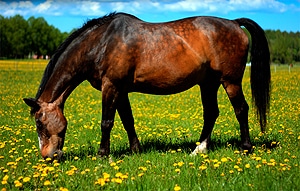Honey works - we treated a horse injury caused by a barbed-wire fence with raw, wildflower honey. He healed in a week!!!
 A simple application of honey to horses' leg wounds results in smaller wound sizes and faster healing time, University of Sydney researchers have found.
A simple application of honey to horses' leg wounds results in smaller wound sizes and faster healing time, University of Sydney researchers have found.
 A simple application of honey to horses' leg wounds results in smaller wound sizes and faster healing time, University of Sydney researchers have found.
A simple application of honey to horses' leg wounds results in smaller wound sizes and faster healing time, University of Sydney researchers have found.Honey has been used to treat wounds in humans since ancient Egypt, but this study, using manuka honey from Australia and New Zealand, is the first time in the world a clinical trial has been conducted in horses.
"Wounds in horses, particularly leg wounds, have long healing periods. But we found applying a manuka honey gel throughout healing led to 27 percent faster healing times," said lead researcher Dr Andrea Bischofberger.
"Wounds in horses which received no treatment took an average of 64 days to heal, while those treated with manuka honey gel took 47 days to heal," said Dr Bischofberger, who will present her findings this Friday 1 July at a veterinary science conference.
"In our pilot study we used pure honey, but in our second study we used a water-based manuka honey gel of 66 percent honey. When applied for 12 days we found these wounds healed just as well as those treated with pure honey."
Using a manuka honey gel means expensive bandages can be avoided, Dr Bischofberger explained. "With its faster wound healing times and its bandage-free application, the manuka honey gel solution is an extremely versatile and affordable topical wound product."
In a third study Dr Bischofberger and colleagues investigated how manuka honey actually worked to speed up wound healing. While it seems to have an anti-bacterial effect and immune-modifying effect on the key initial healing phase, the inflammatory stage, the honey's exact healing mechanism is still unclear.
"What we do know is treating wounds with manuka honey leads to healthier tissue regrowth," Dr Bischofberger said.
"Wounds treated with manuka also showed improved new blood vessel and skin surface growth compared to control wounds," Dr Bischofberger added.
Dr Bischofberger is a Swiss veterinarian currently with the Research and Clinical Training Unit(REaCT) at the University Veterinary Teaching Hospital in Camden (UVTHC), a part of the University of Sydney.
REaCT Director, Professor Andrew Dart, is a surgical specialist and expert on the complications associated with lower leg wound healing in horses, and is supervising Dr Bischofberger's research.
"Wound healing in horses' limbs, particularly lower limbs, is usually a long and complicated process compared to wounds on the body," he said.
"The results of these studies have led to significant national and international interest both from the animal and human fields. There is potential for the manuka honey gel to be used across species with similar beneficial effects."

No comments:
Post a Comment